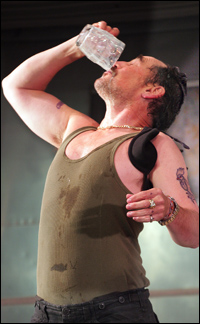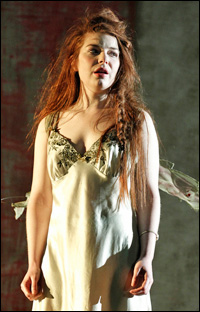
With three Tony Awards under her belt for the revivals of La Cage aux Folles, The Norman Conquests and Boeing Boeing, Friedman, whose background is in new writing, is behind five bold works that opened during the 2010-2011 Broadway season.
On the revival front, Friedman is on the producing team of La Bête, The House of Blue Leaves and the Tony-nominated revival of Arcadia; while she is also presenting the critically praised productions of The Book of Mormon and Jerusalem, which are contenders for the Best Musical and Best Play Tony categories, respectively.
Jerusalem, which is crowned with a tour-de-force performance by Tony and Olivier Award-winning actor Mark Rylance, earned critical raves and recently extended its Broadway run through Aug. 21. Playbill.com spoke with Friedman about the gamble of bringing such a dense play to American audiences and her passion for new writers.
"Jerusalem I saw at the Royal Court, and I was a little bit frightened of it in terms of its scale, the ideas and the epic nature of it. But as a producer who wants to have a reputation for producing and promoting new work, I knew that if I didn't do this, I couldn't call myself a producer," she said.
| |
 |
|
| Mark Rylance in Jerusalem. | ||
| photo by Simon Annand |
London hits don't always guarantee success, and Friedman is well aware of the gamble. Lucy Prebble's Enron, a hit in London, failed to catch on with American audiences and shuttered after 38 performances on Broadway. "It's just about momentum and heat," she said. "And yes, it's hard to raise the money for them and hard to position them. Yes, it's hard to explain to an American audience sometimes why they need to see it, but what I don't find hard is making the choice to support great work. Because that's what I feel I need to do as a producer. So, it was inevitable that Jerusalem would come to New York. What was not inevitable is that it would work."
| |
 |
|
| Aimeé-Ffion Edwards in Jerusalem. | ||
| photo by Joan Marcus |
Part of the momentum is Rylance's performance as Johnny Byron, for which he is nominated in the Best Actor category. "You fall in love with this antihero, and it's a very complicated reaction you have at the end, because Johnny Byron on paper could be a villain, but he's not. He's flawed like so many of us in our own ways, but there's this incredible moral streak to him and this soul that you care so deeply about. I think it's a complex reaction you have to this character because he's so flawed and yet so wonderful," she said.
Though playwright Butterworth has commented that he didn't set out to write a dramatic commentary on the state of the nation, critics, audiences and Friedman herself can't help but identify with Jerusalem in such a way. "I think also there's the state of the nation piece," she explained. "Which I think resonates as much here as it does in Britain. Where are we as a society? What our values are. What we care most about. Money first? Jez has managed to weave very important subject matter about where we are as a nation into this mythic piece of storytelling."
That mysticism, which comes full circle in the play's final moments, is something that also grabs audiences and keeps them shaking long after the curtain comes down on Jerusalem. "It's primal. It's absolutely primal. We believe in giants. We believe in fairy tales. It's childlike in that sense. We can believe that we can make a difference perhaps. I think those things we forget about as we march through life and have to deal with all the terrible problems. We forget to bring it back to its basics, which is: It's us on this earth struggling through," Friedman said.
Visit JerusalemBroadway.com.
View highlights from the show:










